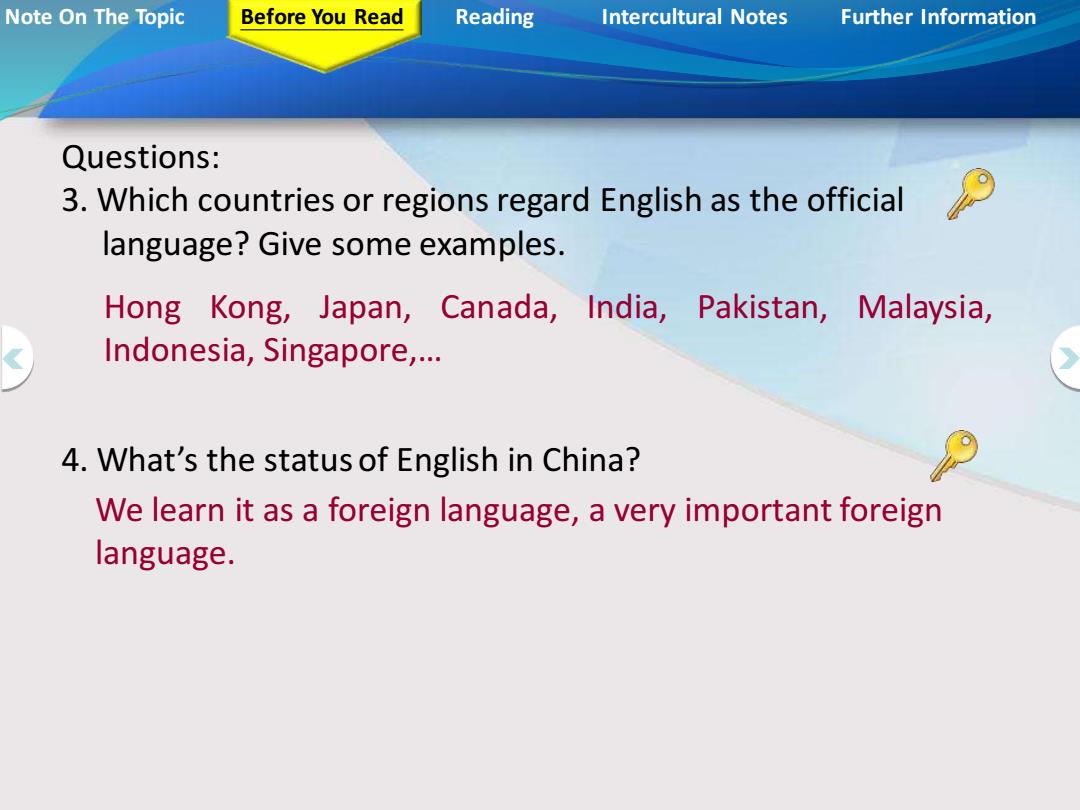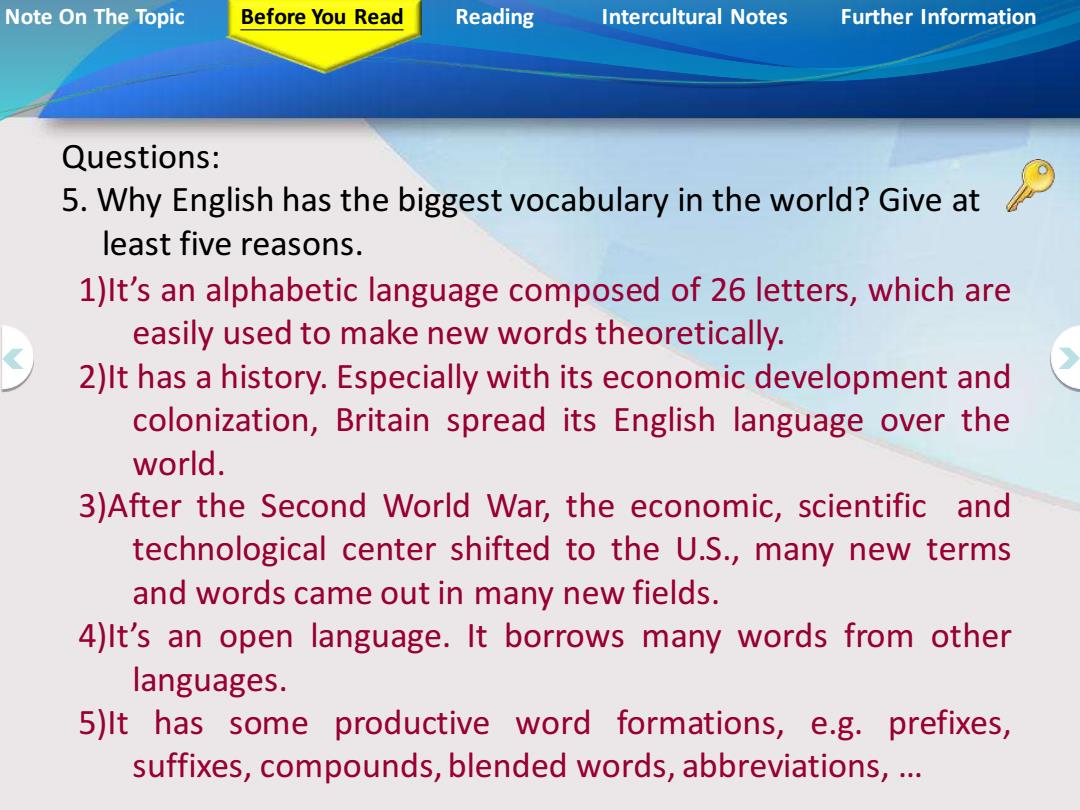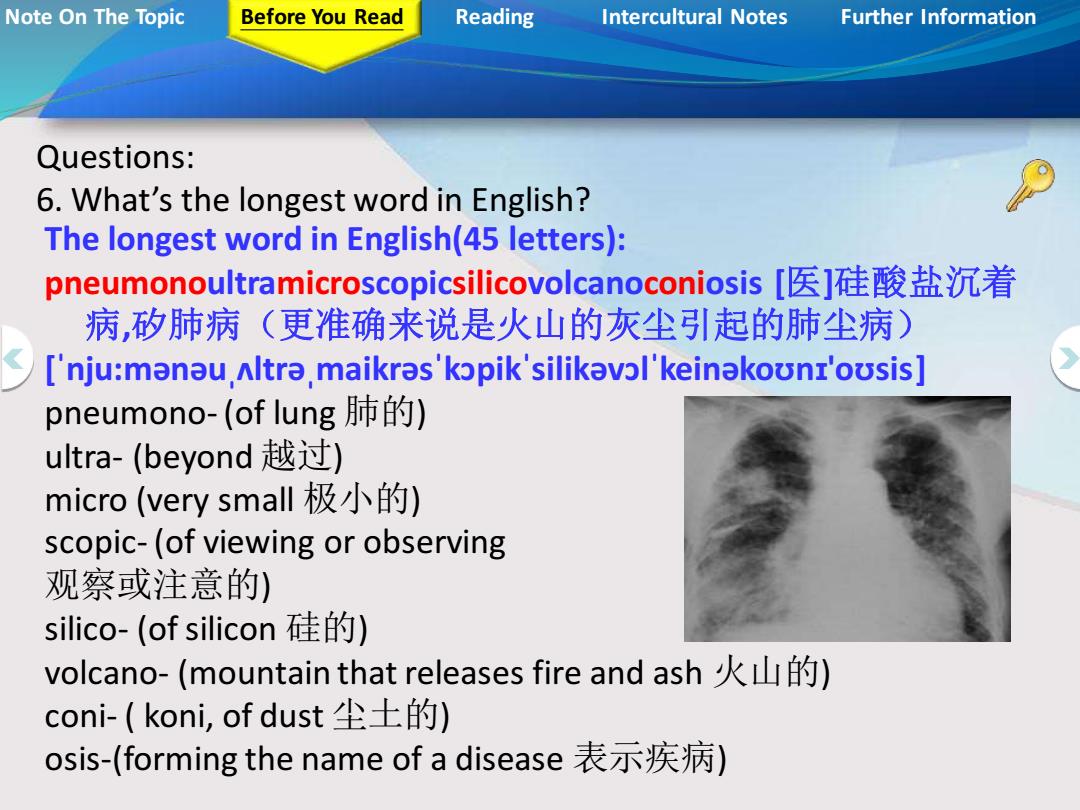
Note On The Topic Before You Read Reading Intercultural Notes Further Information Lead-in Questions: 1.What language is the most popular in the world?Why? English,of course.The reasons are as follows: a)Most important international language; b) Easy to communicate with foreign people,academic conferences,etc.; c)Good for people to look for jobs; d) Basic requirement for the Web language; 2.Which countries regard English as the mother tongue? Britain,U.S.A.,Canada,Australia,New Zealand,Ireland, South Africa
Lead-in Questions: 1. What language is the most popular in the world? Why? 2. Which countries regard English as the mother tongue? English, of course. The reasons are as follows: a) Most important international language; b) Easy to communicate with foreign people, academic conferences, etc.; c) Good for people to look for jobs; d) Basic requirement for the Web language; Britain, U.S.A., Canada, Australia, New Zealand, Ireland, South Africa. Note On The Topic Before You Read Reading Intercultural Notes Further Information

Note On The Topic Before You Read Reading Intercultural Notes Further Information Questions: 3.Which countries or regions regard English as the official language?Give some examples. Hong Kong,Japan,Canada,India,Pakistan,Malaysia, Indonesia,Singapore,... 4.What's the status of English in China? We learn it as a foreign language,a very important foreign language
Questions: 3. Which countries or regions regard English as the official language? Give some examples. 4. What’s the status of English in China? Hong Kong, Japan, Canada, India, Pakistan, Malaysia, Indonesia, Singapore,… We learn it as a foreign language, a very important foreign language. Note On The Topic Before You Read Reading Intercultural Notes Further Information

Note On The Topic Before You Read Reading Intercultural Notes Further Information Questions: 5.Why English has the biggest vocabulary in the world?Give at least five reasons. 1)It's an alphabetic language composed of 26 letters,which are easily used to make new words theoretically. 2)It has a history.Especially with its economic development and colonization,Britain spread its English language over the world. 3)After the Second World War,the economic,scientific and technological center shifted to the U.S.,many new terms and words came out in many new fields. 4)It's an open language.It borrows many words from other languages. 5)It has some productive word formations,e.g.prefixes, suffixes,compounds,blended words,abbreviations
Questions: 5. Why English has the biggest vocabulary in the world? Give at least five reasons. 1)It’s an alphabetic language composed of 26 letters, which are easily used to make new words theoretically. 2)It has a history. Especially with its economic development and colonization, Britain spread its English language over the world. 3)After the Second World War, the economic, scientific and technological center shifted to the U.S., many new terms and words came out in many new fields. 4)It’s an open language. It borrows many words from other languages. 5)It has some productive word formations, e.g. prefixes, suffixes, compounds, blended words, abbreviations, … Note On The Topic Before You Read Reading Intercultural Notes Further Information

Note On The Topic Before You Read Reading Intercultural Notes Further Information Questions: 6.What's the longest word in English? The longest word in English(45 letters): pneumonoultramicroscopicsilicovolcanoconiosis[医]硅酸盐沉着 病,矽肺病(更准确来说是火山的灰尘引起的肺尘病) ['nju:manau,Altra,maikras'kopik'silikevol'keinakounr'ousis] pneumono-(of lung肺的) ultra-(beyond越过) micro(very small极小的) scopic-(of viewing or observing 观察或注意的) silico-(of silicon硅的) volcano-(mountain that releases fire and ash火山的) coni-(koni,of dust尘土的) osis-(forming the name of a disease表示疾病)
Questions: 6. What’s the longest word in English? The longest word in English(45 letters): pneumonoultramicroscopicsilicovolcanoconiosis [医]硅酸盐沉着 病,矽肺病(更准确来说是火山的灰尘引起的肺尘病) [ˈnju:mənəuˌʌltrəˌmaikrəsˈkɔpikˈsilikəvɔlˈkeinəkoʊnɪ'oʊsis] pneumono- (of lung 肺的) ultra- (beyond 越过) micro (very small 极小的) scopic- (of viewing or observing 观察或注意的) silico- (of silicon 硅的) volcano- (mountain that releases fire and ash 火山的) coni- ( koni, of dust 尘土的) osis-(forming the name of a disease 表示疾病) Note On The Topic Before You Read Reading Intercultural Notes Further Information

Note On The Topic Before You Read Reading Intercultural Notes Further Information Questions: 6.Other longer words in English? Antidisestablishmentarianism 元多
Questions: 6. Other longer words in English? Note On The Topic Before You Read Reading Intercultural Notes Further Information